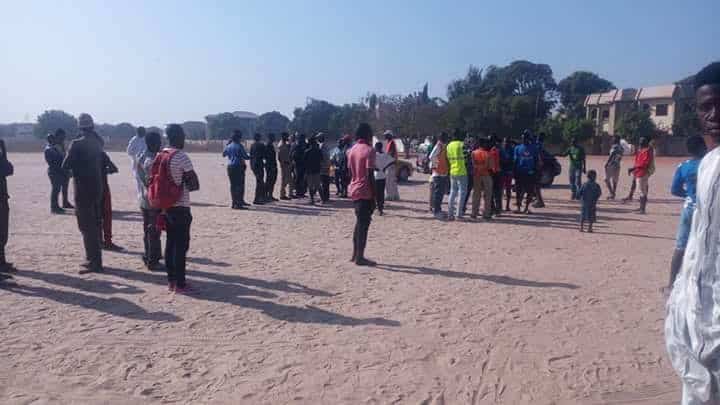
“The protection of minorities is vitally important; and even the most orthodox of us may find himself in a minority someday, so that we all have an interest in restraining the tyranny of majorities.”- Bertrand Russell.
We are an emergent democracy – it is well past time that we stop excusing or ignoring – or worse, endorsing — these attacks on the truth. For if we compromise the truth for the sake of our politics, we are lost. Our government is a Constitutional Republic which was designed with democratically elected representation in the legislative branch. We are afforded the right to elect, by majority, our law makers, within a republic that includes the balance of protecting the minority against the tyranny of the majority.
Absolute democracies are dangerous. Full republics can end up anarchy. The Gambia did have a constitutional republic in which the government governs the land, not the people. That is why we are “free”. The core fundamental principles construct and protect minority’s rights endowed resources against tyranny of the majority at the expense of those in the minority.
Eternal vigilance is the price of liberty. When a government or an oligarchy uses crass nationalism and nepotism not fighting corruption and ethic chauvinism over land ownership and we clap, we are digging our own stupid graves. Nothing from this government, no matter how reprehensible, has been worthy of the rebuke of his hailers down Kombo South. They forget that the world will be destroyed by self-righteous strongmen who are rabidly supported by hordes of unquestioning men and women.
“Barbarians,” Aristotle said, “being more servile in character than Hellenes, and Asiatic than Europeans, do not rebel against a despotic government.” People of wisdom won’t ever be comfortable with lion feeding wayward antelopes daily to his own cubs in the name of sanitizing the forest. The fourth president of the United States, James Maddison, warned his people that “if tyranny and oppression come to this land, it will be in the guise of fighting a foreign enemy.” Maddison again warned that all men having power ought to be distrusted to a certain extent because “where there is interest and power to do wrong, wrong will generally be done.” We will see more from the Adama Barrow presidency going forward.
Mahatma Gandhi had once said, to judge how civilized a nation is, just look at how it treats its own minorities. Going by this yardstick, The Gambia does not make a passing grade since independence. In the Gambia, minorities suffer from so-called “horizontal and vertical inequality.” While on paper they may enjoy legal equality, in real life, the playing field remains uneven. No regime is any different in protecting minority rights.
Indigenous Manjago people can’t choose their own way of life; get control over their own education, healthcare and so on, unless their lands are secure. That’s the overwhelming priority. All other issues are secondary. If their land rights are recognized, tribal peoples thrive. If they’re not, the outlook is bleak.
Without land, indigenous peoples have no livelihood, no identity and no means of survival. In this context, states need to respect the principle of free, prior and informed consent. Indigenous peoples need to be consulted about use of their land and included in development processes. Government and local government authorities need to take this on board too and conduct proper due diligence prior to embarking on, and during developmental projects.
Village cemeteries have been attacked and farmlands have been destroyed over insistence on grazing rights. The land law that I know gives preeminent recognition to first settlers and users of land – aboriginal settlers. Unfortunately, those who are insisting on an antediluvian, itinerant, Masai like, nomadic pastoralism and animal husbandry, a Stone Age cattle rearing model in the 21st century are being tolerated to be on the prowl. They plunder. They are not confined to ranches supported by irrigated grass fields in Southern Kombo and all over the Gambia. Some local government officials have even declared very irresponsibly that many of them are not good citizens. How many of these land squatters have been arrested, prosecuted and are in jail right now? How many?
The people that issued an ultimatum to Manjagos to leave their land were granted the luxury of undisturbed gathering to be issuing, reiterating and withdrawing their ultimatum. No arrest. No prosecution. No jail. No reprimand.
And the Manjagos, a tribal minority, who has been at the receiving end of a community that had court orders in their favour. After hundreds of them were reportedly denied 120 years of their ancestors’ land. Court orders are being issued not disobeyed. Where are the torrents of opinions demanding revocation to these orders?
While condemning the irresponsible behaviour of a person or a group which can lead to breakdown of law and order and bloodshed in our country, Gambians should not forget similar irresponsible behaviour of others that may lead to the same consequence. Justice is indivisible.
Indigenous peoples’ key role in conservation – which is often one of the reasons used for their eviction – needs to be recognized. Indigenous peoples’ dependence on the land for food, shelter, identity and survival has resulted in a deep respect for that land and a need to conserve it. Indigenous peoples traditionally develop a set of conservation measures that are passed down from one generation to the next, and as a result they should be the best people to conserve that land.
The concept of minority rights remains largely underdeveloped not only in the Gambia but in Africa. Traditionally, a large majority of African countries have adopted an attitude marked by political scepticism and juridical ambiguity towards the rights of minorities. Constitutionally, only a handful of African countries have acknowledged the need to protect the rights of minorities. As noted by (C. Heyns 2006) in a recent review of all the constitutions of Africa: “only three African constitutions protect minority rights making specific reference to ‘minorities.” These constitutions are those of Cameroon (preamble), the Democratic Republic of Congo (article. 51), and Uganda (article. 36). Out of the 48 Sub-Saharan countries, this represents a very small minority of countries having adopted a special legal framework of protection for minorities.
By Alagi Yorro Jallow











Recent Comments